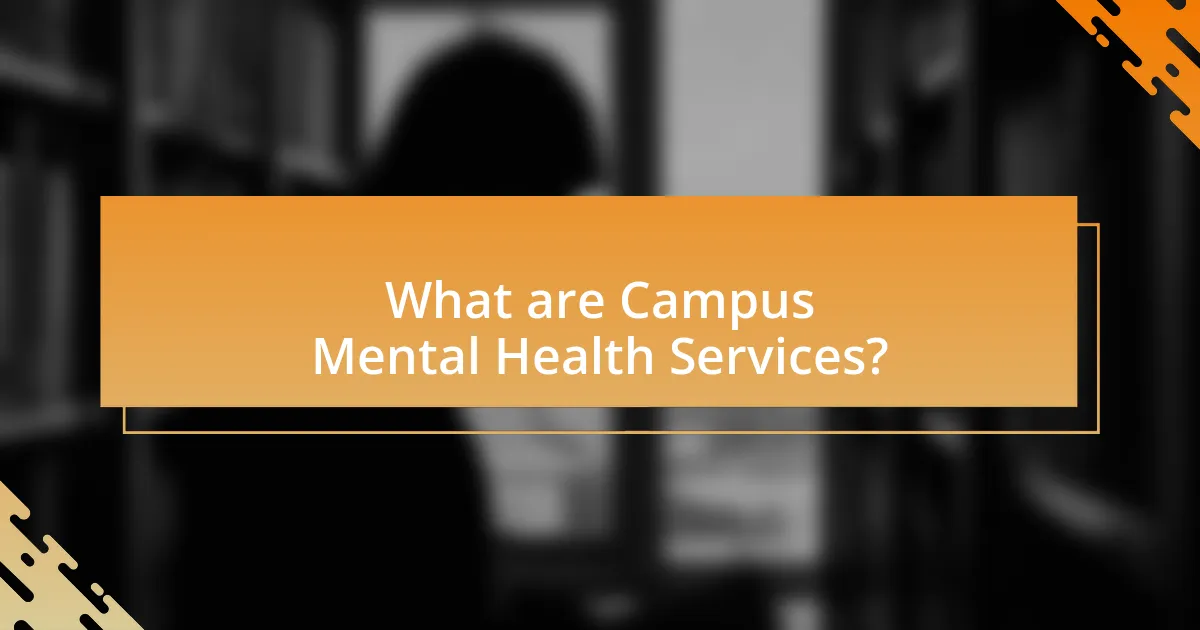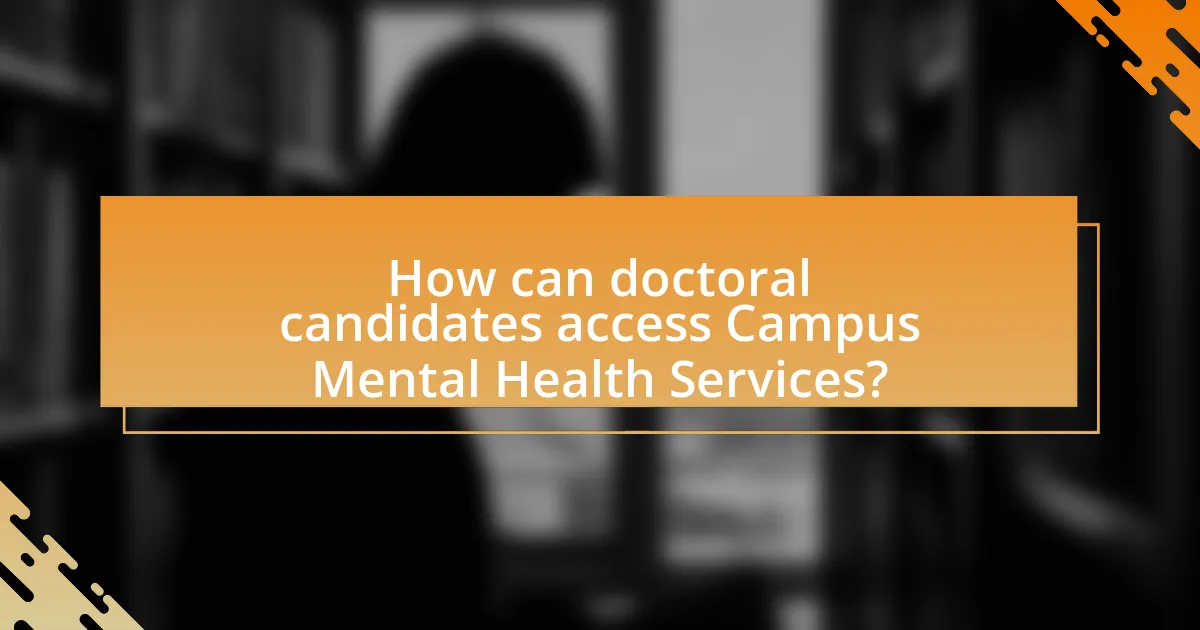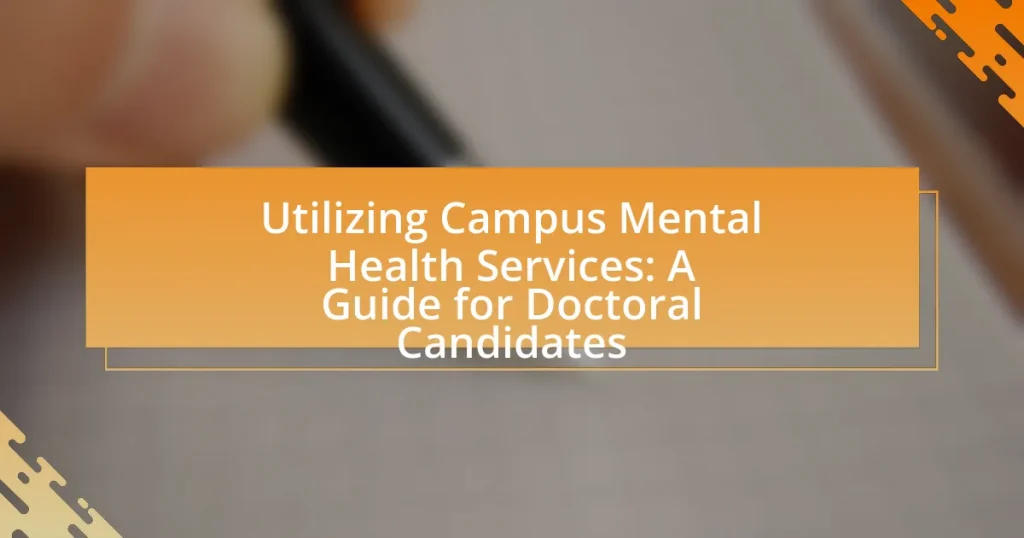Campus Mental Health Services are essential resources provided by educational institutions to support the psychological well-being of students, particularly doctoral candidates who face unique stressors during their studies. These services include counseling, crisis intervention, and workshops aimed at addressing mental health challenges such as anxiety and depression. The article outlines the importance of utilizing these services, the specific resources available, and the barriers candidates may encounter in accessing support. It emphasizes the benefits of early intervention and tailored mental health resources, highlighting the critical role these services play in enhancing academic performance and overall well-being for doctoral students.

What are Campus Mental Health Services?
Campus Mental Health Services are specialized programs and resources provided by educational institutions to support the psychological well-being of students. These services typically include counseling, therapy, crisis intervention, and mental health education, aimed at addressing issues such as anxiety, depression, and stress management. According to the American College Health Association, nearly 40% of college students reported feeling so depressed that it was difficult to function, highlighting the critical need for accessible mental health support on campuses.
How do Campus Mental Health Services support doctoral candidates?
Campus Mental Health Services support doctoral candidates by providing tailored psychological support, counseling, and resources to address the unique stressors associated with doctoral studies. These services often include individual therapy, group therapy, workshops on stress management, and academic counseling, which help candidates cope with anxiety, depression, and academic pressures. Research indicates that students who utilize mental health services report improved academic performance and overall well-being, highlighting the effectiveness of these resources in fostering a supportive environment for doctoral candidates.
What types of services are typically offered?
Campus mental health services typically offer counseling, psychological assessments, crisis intervention, and workshops on stress management and coping skills. These services are designed to support students’ mental well-being and academic success. For instance, counseling services often include individual therapy sessions, group therapy, and support for specific issues such as anxiety and depression, which are common among doctoral candidates. Additionally, workshops may provide practical skills for managing the unique pressures of graduate studies, reinforcing the importance of mental health in academic environments.
How are these services tailored for the needs of doctoral candidates?
Campus mental health services are tailored for the needs of doctoral candidates by offering specialized counseling, workshops, and resources that address the unique stressors and challenges faced during doctoral studies. These services often include academic stress management, coping strategies for isolation, and support for work-life balance, which are critical for maintaining mental well-being in a demanding academic environment. Research indicates that doctoral candidates experience higher levels of anxiety and depression compared to the general population, highlighting the necessity for targeted mental health support. By providing individualized therapy sessions and group support tailored to the academic context, these services effectively meet the specific psychological needs of doctoral students.
Why is it important for doctoral candidates to utilize these services?
Utilizing campus mental health services is crucial for doctoral candidates to maintain their well-being and academic performance. These services provide essential support in managing stress, anxiety, and other mental health challenges that are common during the demanding doctoral journey. Research indicates that students who engage with mental health resources report improved academic outcomes and overall life satisfaction. For instance, a study published in the Journal of College Student Psychotherapy found that students who utilized counseling services experienced significant reductions in psychological distress and enhanced academic functioning. Therefore, accessing these services is vital for doctoral candidates to navigate their rigorous academic environment effectively.
What mental health challenges do doctoral candidates commonly face?
Doctoral candidates commonly face mental health challenges such as anxiety, depression, and stress. These issues often stem from the high demands of academic work, isolation, and pressure to publish or secure funding. Research indicates that approximately 40% of doctoral students experience significant anxiety, while around 30% report depressive symptoms, highlighting the prevalence of these mental health concerns in this population.
How can early intervention improve academic success?
Early intervention can significantly improve academic success by addressing mental health issues before they escalate. Research indicates that timely support, such as counseling and academic resources, can enhance students’ coping strategies, leading to better academic performance. For instance, a study published in the Journal of College Student Psychotherapy found that students who engaged in early mental health interventions reported higher GPAs and improved retention rates compared to those who did not seek help. This demonstrates that proactive measures can create a supportive environment that fosters academic achievement.

How can doctoral candidates access Campus Mental Health Services?
Doctoral candidates can access Campus Mental Health Services by visiting the university’s mental health website or contacting the campus counseling center directly. Most universities provide online resources, including appointment scheduling, service descriptions, and contact information for mental health professionals. Additionally, many campuses offer walk-in services or crisis hotlines for immediate support. Accessing these services is typically available to all enrolled students, including doctoral candidates, ensuring they receive the necessary mental health support.
What steps should candidates take to seek help?
Candidates should first identify their specific mental health needs and then reach out to their campus mental health services. This can involve visiting the university’s counseling center website to understand available resources, such as individual therapy, group sessions, or workshops. After identifying the appropriate service, candidates should schedule an appointment, which may often be done online or via phone. It is also beneficial for candidates to prepare for the appointment by noting down their concerns and any relevant personal history to facilitate a productive discussion. Research indicates that early intervention in mental health can significantly improve outcomes, highlighting the importance of seeking help promptly.
How can candidates find the right services for their needs?
Candidates can find the right services for their needs by researching available campus mental health resources and assessing their specific requirements. They should start by visiting their university’s mental health services website, which typically lists available programs, counseling options, and support groups tailored for doctoral candidates. Additionally, candidates can consult with academic advisors or faculty members who may provide recommendations based on their experiences. Engaging in peer discussions can also yield insights into effective services utilized by fellow students. Research indicates that personalized approaches to mental health support significantly enhance student well-being, making it crucial for candidates to identify services that align with their unique challenges and preferences.
What information is typically required during the initial consultation?
During the initial consultation for campus mental health services, individuals are typically required to provide personal information such as their name, contact details, and student identification number. Additionally, they may need to disclose their reason for seeking help, any relevant medical history, current mental health concerns, and information about previous mental health treatment. This information helps mental health professionals assess the individual’s needs and develop an appropriate treatment plan.
What barriers might doctoral candidates face in accessing these services?
Doctoral candidates may face several barriers in accessing campus mental health services, including stigma, lack of awareness, and limited availability of resources. Stigma surrounding mental health can deter candidates from seeking help, as they may fear judgment from peers or faculty. Additionally, many doctoral candidates may not be fully aware of the mental health services available to them, leading to underutilization. Furthermore, the limited availability of mental health professionals on campus can result in long wait times for appointments, making it difficult for candidates to receive timely support. These barriers collectively hinder access to essential mental health resources for doctoral candidates.
How can stigma around mental health affect help-seeking behavior?
Stigma around mental health significantly hinders help-seeking behavior by instilling fear of judgment and discrimination in individuals. This fear often leads to avoidance of seeking necessary support, as individuals may worry about being labeled or treated differently by peers and faculty. Research indicates that approximately 60% of individuals with mental health issues do not seek help due to stigma-related concerns, highlighting the pervasive impact of societal attitudes on personal decisions. Furthermore, studies show that environments perceived as stigmatizing can exacerbate feelings of isolation and hopelessness, further discouraging individuals from utilizing available mental health resources.
What logistical challenges might candidates encounter?
Candidates might encounter logistical challenges such as scheduling conflicts, limited availability of mental health services, and transportation issues. Scheduling conflicts arise when candidates have tight academic or research commitments that make it difficult to attend appointments. Limited availability of mental health services can occur due to high demand, resulting in long wait times for appointments. Transportation issues may include difficulties in accessing campus facilities, especially for candidates who rely on public transport or have mobility constraints. These challenges can hinder candidates’ ability to effectively utilize mental health resources on campus.

What specific resources are available for doctoral candidates?
Doctoral candidates have access to various specific resources, including counseling services, mental health workshops, peer support groups, and academic advising. Counseling services provide individual therapy and crisis intervention, while mental health workshops focus on stress management and coping strategies. Peer support groups offer a community for sharing experiences and challenges, and academic advising helps candidates navigate their academic journey effectively. These resources are designed to support the mental well-being and academic success of doctoral candidates, ensuring they have the necessary tools to manage the demands of their programs.
What types of counseling options are offered?
Campus mental health services typically offer various counseling options, including individual therapy, group therapy, couples counseling, and crisis intervention. Individual therapy provides personalized support for specific mental health concerns, while group therapy allows individuals to share experiences and coping strategies in a supportive environment. Couples counseling focuses on relationship dynamics and communication, and crisis intervention offers immediate support for urgent mental health issues. These options are designed to address the diverse needs of doctoral candidates, ensuring accessible mental health care tailored to their unique challenges.
How do individual counseling sessions differ from group therapy?
Individual counseling sessions focus on one-on-one interactions between a therapist and a client, allowing for personalized attention and tailored treatment plans. In contrast, group therapy involves multiple participants sharing their experiences and support in a collective setting, which fosters community and shared learning. Individual counseling is beneficial for addressing specific personal issues in depth, while group therapy provides a sense of belonging and the opportunity to learn from others’ perspectives. Research indicates that both modalities can be effective, but their suitability depends on individual needs and preferences.
What role do workshops and seminars play in mental health support?
Workshops and seminars play a crucial role in mental health support by providing structured environments for education, skill development, and community building. These events facilitate the dissemination of information about mental health issues, coping strategies, and available resources, which can empower individuals to seek help and improve their well-being. Research indicates that participation in such programs can lead to increased awareness and reduced stigma surrounding mental health, as well as enhanced social support networks among attendees. For instance, a study published in the Journal of Mental Health found that participants in mental health workshops reported significant improvements in their understanding of mental health issues and increased willingness to engage in supportive behaviors.
How can candidates utilize online resources effectively?
Candidates can utilize online resources effectively by actively engaging with mental health platforms, utilizing academic databases, and participating in online forums. Engaging with mental health platforms allows candidates to access counseling services, mental health workshops, and self-help resources tailored to their needs. Utilizing academic databases provides candidates with research articles and studies that can inform their understanding of mental health issues relevant to doctoral studies. Participating in online forums fosters community support, enabling candidates to share experiences and coping strategies, which is crucial for mental well-being. These methods are supported by research indicating that online mental health resources can improve access to care and reduce stigma associated with seeking help.
What online platforms provide mental health support for students?
Online platforms that provide mental health support for students include BetterHelp, Talkspace, and 7 Cups. BetterHelp offers professional counseling via messaging, video, and phone calls, making it accessible for students. Talkspace provides therapy through text, audio, and video, allowing flexibility in communication. 7 Cups offers free emotional support through trained listeners and licensed therapists, catering specifically to students’ needs. These platforms are validated by their user bases and positive reviews, demonstrating their effectiveness in supporting mental health among students.
How can candidates engage with virtual counseling services?
Candidates can engage with virtual counseling services by accessing their campus mental health platform, which typically offers online appointment scheduling and teletherapy options. Many universities provide a dedicated website or app where candidates can log in using their student credentials to book sessions with licensed counselors. Additionally, candidates can participate in virtual workshops and support groups that are often advertised through campus emails or mental health newsletters. These services are designed to be accessible and confidential, ensuring that candidates receive the support they need while maintaining their privacy.
What best practices should doctoral candidates follow when utilizing these services?
Doctoral candidates should prioritize proactive engagement with campus mental health services by scheduling regular appointments and utilizing available resources. Regularly attending sessions can help candidates address stress, anxiety, and other mental health concerns effectively. Additionally, candidates should familiarize themselves with the specific services offered, such as counseling, workshops, and support groups, to tailor their approach to their individual needs. Research indicates that consistent use of mental health services can lead to improved academic performance and overall well-being, as highlighted in a study by Eisenberg et al. (2009) published in the Journal of American College Health, which found that students who engage with mental health resources report lower levels of distress and higher academic success.
How can candidates prepare for their first appointment?
Candidates can prepare for their first appointment by reflecting on their mental health concerns and identifying specific issues they wish to discuss. This preparation allows candidates to articulate their thoughts clearly during the session. Additionally, reviewing any relevant personal history, such as previous mental health experiences or significant life events, can provide context for the mental health professional. Research indicates that individuals who come prepared with specific topics tend to have more productive sessions, as they can focus on their immediate needs and goals.
What strategies can enhance the effectiveness of counseling sessions?
To enhance the effectiveness of counseling sessions, establishing a strong therapeutic alliance between the counselor and the client is crucial. Research indicates that a positive relationship significantly impacts treatment outcomes, with studies showing that the quality of this alliance can account for up to 30% of the variance in client improvement (Horvath & Symonds, 1991). Additionally, employing evidence-based techniques, such as cognitive-behavioral strategies, can provide structured approaches that have been proven to be effective in addressing various mental health issues. Furthermore, setting clear goals collaboratively with clients can enhance focus and motivation, leading to more productive sessions. Regular feedback from clients about their experiences and progress can also help tailor the counseling process to better meet their needs, thereby increasing overall effectiveness.



